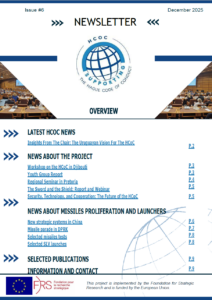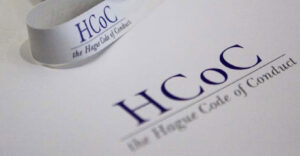
On 29 may 2019, in the context of the Space Security Conference, organized by the United Nations Institute for Disarmament Research (UNIDIR), the FRS conducted a panel dedicated to the HCoC.
Moderator :
- Dr Xavier Pasco, Director, Fondation pour la recherche stratégique
Panel :
- Amb. Ann-Sofie Nilsson, Swedish Ambassador for Disarmament and Non-Proliferation
- Ms Isabelle Sourbes, Research Director, Centre national de la recherche scientifique
- Mr Tal Inbar, Head of the Space Research Center, Fisher Institute for Air & Space Strategic Studies
The panels of the Space Security Conference can be viewed on the following link:


